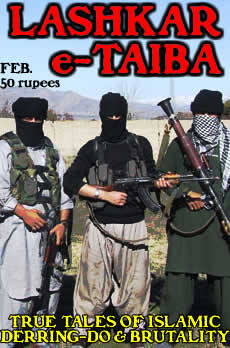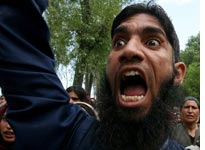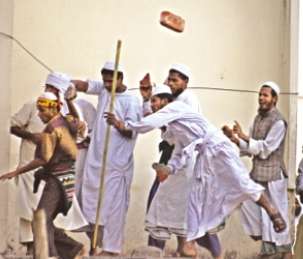Chief operational commander of Lashkar-e-Taiba (LT) Zakiur Rehman Lakhvi, arrested on December 10 by the Pakistani authorities in the wake of the Mumbai attacks, is furious at the Jamaat-ud-Daawa (JuD) leadership's decision to publicly disown him in his hour of trial instead of trying to bail him out.
According to circles close to the Pakistani authorities, involved in grilling Lakhvi to ascertain whether the LT is actually involved in the Mumbai mayhem, the commander is extremely hurt by a recent statement from a JuD spokesman that both the arrested Lashkar leaders Zakiur Rehman and Zarar Shah never had any link with either Hafiz Mohammad Saeed or the JuD.
In a bid to shield Saeed, JuD spokesman Abdullah Muntazir told the Times of India on January 9, 2008: "In any case, Lakhvi and Zarar, the two men India is talking about, were never associated with the JuD, which has always been into charity work only."
It had been conveyed by Hafiz Saeed himself in the wake of the Mumbai terror strikes, the spokesman said, adding there were elements in the Pakistan government that wanted to target religious organisations. Circles close to Hafiz Saeed say there was nothing new in the JuD spokesman's stance as its leadership had repeatedly denied any link with them.
But a former LT office-bearer -- now a part of the JuD -- confirmed on condition of anonymity that Lakhvi was extremely upset over the U-turn taken by his former close associates and complains they had abandoned him at a time when he desperately needed their backing.
Zakiur Rehman Lakhvi, alias Abu Waheed Irshad Ahmad, comes from the Okara district of the Punjab province. Ajmal Amir Kasab, the lone Mumbai attacker caught alive by the Indian authorities, belongs to the same area.
Born on December 30, 1960 to the lower middle class family of Hafiz Azizur Rehman in Chak No. 18 of Rinala Khurd in Okara, Lakhvi is considered to be a close associate of Hafiz Saeed and has been named by Ajmal Kasab as his trainer as well as the planner of the Mumbai carnage. While Pakistan has already turned down an Indian demand for Lakhvi's extradition despite American pressure, the JuD has deemed it fit to disown him.
In 1988, Abu Abdur Rahman Sareehi, a Saudi national and allegedly a close associate of Osama bin Laden, founded in Afghanistan's eastern province of Kunar an organisation which recruited Afghan youths and Pakistanis from the Bajaur Agency to fight Soviet occupation troops in the Central Asian country.
Sareehi, the brother-in-law of Zaki Lakhvi, is believed to have contributed a hefty amount of Rs10 million to the construction of the Muridke headquarters of the Lashkar-i-Taiba, called the Markaz Daawa Wal Irshad, way back in 1988. The organisation flourished in Kunar and Bajaur areas as thousands of youths from Pakistan belonging to the Deobandi Salafi school of thought instantly joined its camps set up in Afghan provinces of Kunar and Paktia, both of which had a sizable number of Ahle Hadith (Wahabi) followers of Islam, besides hundreds of Saudis and Afghans.
International media reports say Zaki Lakhvi was one of the main trainers at the Kunar camp of anti-Soviet militants. As the Lashkar had joined the Afghan jihad at a time it was winding down, the group did not play a major part in the fight against the Soviet forces, which pulled out in 1989.
However, the participation of the Lashkar cadres in the Afghan jihad helped its leaders, particularly Hafiz Saeed and Zaki Lakhvi, win the trust of the Pakistani establishment. The insurgency in Jammu and Kashmir, beginning in 1989, came at an appropriate time to provide an active battleground for the Lashkar fighters when its leadership was made to divert its attention from Afghanistan and devote itself to the jihad in Kashmir, where it gained fame.
As Lakhvi was subsequently made the supreme commander of the military operations in Jammu and Kashmir, his prime responsibility was to identify young men and indoctrinate them in jihad.
In an April 1999 interview to an English daily from Muzzaffarabad, Lakhvi said: "We are extending our Mujahideen networks across India and preparing the Muslims of India against India. When they are ready, it will be the start of the break-up of India." A few months later, at the three-day annual congregation of the LT held at its Muridke headquarters, 30 kilometres from Lahore, Lakhvi justified the launching of fidayeen missions in Jammu and Kashmir.
He continued: "Following Pakistani withdrawal from the Kargil heights and the Nawaz-Clinton statement in Washington, it was important to boost the morale of the Kashmiri people... These fidayeen missions have been initiated to teach India a lesson as they were celebrating Pakistani withdrawal from Kargil. And let me tell you very clearly that our next target would be New Delhi." Incidentally, the Indian parliament was attacked later on December 13, 2001.
Subsequently, the US State Department declared the Lashkar a terrorist outfit, followed by a similar decision by the Musharraf regime. The LT later renamed itself as Jamaat-ud-Daawa (JuD) in a bid to separate its military actions in Kashmir from its religious undertakings in Pakistan. While stepping down as the Lashkar ameer at a press conference in Lahore on December 23, 2001, Hafiz Saeed appointed Maulana Abdul Wahid Kashmiri as his successor. But Lakhvi was retained as the supreme operational commander of the LT.
However, differences soon erupted between Saeed and Lakhvi over distribution of the organisation's assets, prompting the latter to revolt against Saeed and launch his own splinter group with the name of Khairun Naas (KuN). Their animosity grew to the extent that some of the Zaki-led rebel group members -- largely consisting of LT fighters -- reportedly took oath to assassinate Hafiz Saeed.
According to Saeed's aides, he first came under fire from Zaki when he decided to launch JuD and separated the LT infrastructure from the Jamaat. Lakhvi, being the chief operational commander of the LT, disapproved of the decision, saying it was meant to put the JuD in control of all the funds collected locally and abroad. He was of the view that as heavy donations were being collected in the name of the Kashmir jihad from all over Pakistan as well as abroad, the JuD leadership had no right to the money because it was only a preaching organisation.
Sources close to Lakhvi revealed many of the dissident aides to Saeed were basically annoyed at his second marriage with a fallen mujahid's 28-year-old widow. Saeed was 58 at the time of his marriage and had justified his act by saying the wedding was only meant to provide shelter to the widow of the fighter, who had lost his life in Jammu and Kashmir and had left behind two kids.
However, a year later, Saeed and Lakhvi were made to mend fences and the two were the best of friends at the time of the 26/11 Mumbai terror attacks. But Zaki Lakhvi had already moved the LT headquarters from Muridke to Muzaffarabad by then. In July 2006, the Indian authorities alleged that Azam Cheema, a LT operative accused of being the ring leader in the 2006 bombing of the Mumbai rail network [that killed over 200 people] was trained and sent to the Indian port city by Lakhvi.
The Mumbai police commissioner then claimed that an arrested militant, Abu Anas, has confessed to being the bodyguard of Lakhvi. In May 2008, the US Treasury Department announced freezing the assets of four LT leaders including Lakhvi. In October, 2007, Lakhvi's 20-year-old son Mohammad Qasim was reportedly killed in an encounter with the security forces at the Gamaroo village in Jammu and Kashmir's Bandipora area.
In the aftermath of the Mumbai attacks, the Indian authorities alleged Zaki Lakhvi, usually based in Muzaffarabad, had moved to Karachi in August 2008, the port city from where LT militants set off, so he could direct operations. The sole survivor of the Mumbai attacks, Ajmal Kasab, apparently told police Lakhvi had helped indoctrinate all the attackers.
On December 3, 2008, India finally named him as one of four major planners behind the Mumbai terror attacks. And that he had allegedly offered to pay the Kasab family Rs150,000 for his participation in the assaults. On December 7, 2008, the Pakistani security forces arrested Lakhvi after raiding the JuD headquarters in Muzaffarabad.
The Indian dossier handed over to Pakistan on January 5 includes transcription of intercepted telephonic conversation between the Mumbai attackers and Lakhvi. However, circles close to the arrested LT chief operational commander reject the Indian dossier as a pack of lies and insist Lakhvi has nothing to do with the Mumbai strikes. |
 [INDIATODAY.INTODAY.IN] Top Lashkar-e-Taiba
[INDIATODAY.INTODAY.IN] Top Lashkar-e-Taiba

 [Dawn] EVEN after several attempts in the last few decades, Pakistain has been waiting for its own version of the Arab spring.
[Dawn] EVEN after several attempts in the last few decades, Pakistain has been waiting for its own version of the Arab spring. The lessons the Islamists learned in the Arab world persuaded them to modify their approach and this has contributed towards their successful entrance into the corridors of power. They have also succeeded where others failed, leaving the West no option but to recognise their mandate -- which was not the case when the Islamic Salvation Front scored an electoral victory in Algeria or
The lessons the Islamists learned in the Arab world persuaded them to modify their approach and this has contributed towards their successful entrance into the corridors of power. They have also succeeded where others failed, leaving the West no option but to recognise their mandate -- which was not the case when the Islamic Salvation Front scored an electoral victory in Algeria or  By contrast, in the Arab world, demands for freedom of expression and better economic conditions were the triggers for the spring. On that stage, the constitutional legitimacy of Islam was not the protesters' destination. The Islamists are trying to develop good governance models and trying not to disturb the social contract which their societies have had for a long time.
By contrast, in the Arab world, demands for freedom of expression and better economic conditions were the triggers for the spring. On that stage, the constitutional legitimacy of Islam was not the protesters' destination. The Islamists are trying to develop good governance models and trying not to disturb the social contract which their societies have had for a long time. Despite the contrasts, the Arab world has remained a source of inspiration for Islamists in Pakistain. Different religious parties in the country have maintained links with the governments and Islamist elements in the Arab world, although often these links have only remained confined to groups with a shared sectarian identity. It seems that the religious political parties in Pakistain have failed to make use of the anxiety prevailing among the masses to start a meaningful movement aimed at realising the change they seek.
Despite the contrasts, the Arab world has remained a source of inspiration for Islamists in Pakistain. Different religious parties in the country have maintained links with the governments and Islamist elements in the Arab world, although often these links have only remained confined to groups with a shared sectarian identity. It seems that the religious political parties in Pakistain have failed to make use of the anxiety prevailing among the masses to start a meaningful movement aimed at realising the change they seek. As Pakistain's young are largely confused in their ideological and political vision, the thinking patterns in Pakistain are
As Pakistain's young are largely confused in their ideological and political vision, the thinking patterns in Pakistain are Police on Friday arrested hundreds of activists of opposition parties and religious organisations, including Pakistan Muslim League-Nawaz MNA Khwaja Saad Rafique, as protests against caricatures of Prophet Muhammad (
Police on Friday arrested hundreds of activists of opposition parties and religious organisations, including Pakistan Muslim League-Nawaz MNA Khwaja Saad Rafique, as protests against caricatures of Prophet Muhammad ( Approximately 70 militants of the outlawed group
Approximately 70 militants of the outlawed group